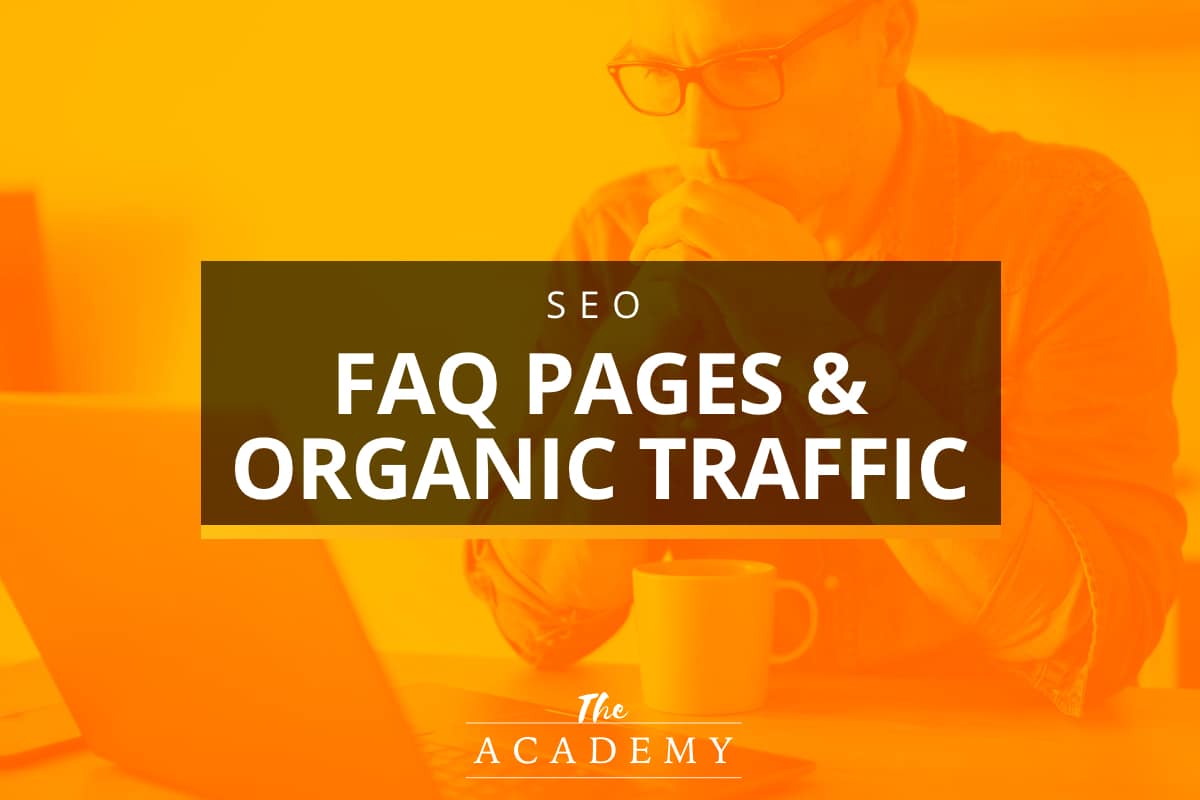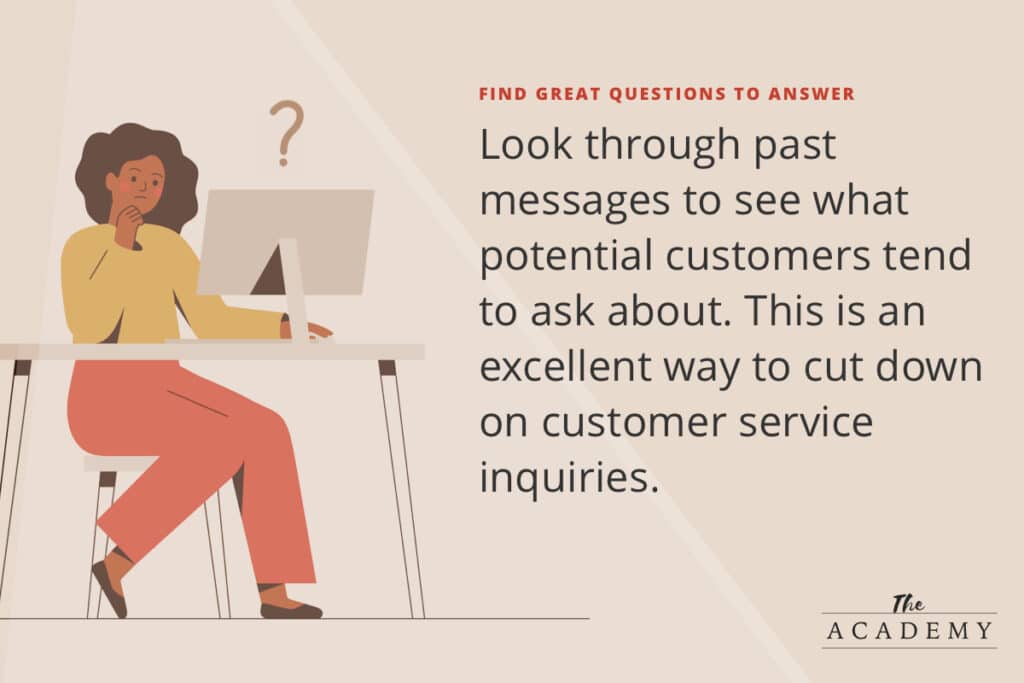
Creating a frequently asked questions page on your website is not a new concept. In fact, these kinds of pages have been around since the earliest days of the internet, and they are a great way to share important information with customers. Also, having a thorough FAQ section can cut down on customer service requests, as users will be able to find many answers on their own without contacting you directly.
That’s all great, but a quality FAQ page can also deliver another benefit… It can serve as a driver of ongoing organic traffic growth. When you design your FAQ page strategically, you can target search terms that you might have missed elsewhere on your site, grabbing traffic along the way and expanding your reach. You never want to pass up an opportunity to connect with more people, so consider investing the time necessary to build this valuable resource.
In this article, we are going to take a closer look at not only why an FAQ page is a good idea for SEO purposes, but also how you can optimize it for the best possible results. This is an exciting topic with the potential to boost your site so let’s get started!
FAQs and SEO
Whether you already have an FAQ page on your site or you are thinking of creating a new one, understanding the potential SEO benefits will help you get the most out of the time spent building this resource. As mentioned above, FAQs are not only about SEO, as they have plenty of other benefits – but the SEO component can help this endeavor wind up being an excellent investment of your time.
So, how can FAQ pages give a boost to SEO? Consider the following:
- Rank for new keywords. Assuming you have an existing SEO game plan in place for your site, you probably create pieces of content to target specific keywords that are relevant to your business. Whether with static pages or blog posts, you are used to the task of writing content with the goal of ranking for important terms. But what about all of those terms that aren’t big enough to warrant investing in a whole page of content? These are great for targeting with FAQs. These are the keywords that don’t get much volume but are still relevant and worth trying to hit. An FAQ page can touch on many such keywords to expand your reach within the niche without going overboard with creating whole pages for minor search terms.
- Provide direct answers. At its core, search is all about answering questions. With an FAQ page, you’ll have a long list of questions and the direct answers to those questions from your perspective. Basically, you’ll be giving the search engine exactly what it wants to see when it is ranking pages. As Google displays more and more “Featured Snippets” at the top of the search results, providing great answers to many questions on this kind of page is an excellent technique to hopefully grab that spot.
- Gain information. Knowing as much as possible about both your site and your audience will help you continue to grow into the future. With an FAQ page, you’ll be able to learn about what those who might be interested in your products or services are searching for in the first place – and the answers might surprise you a bit. For instance, if you see that your FAQ page is getting a lot of traffic based on one or two of the questions you answer, it might be worth expanding on those answers and giving them their own pages. You’ll know for certain that your audience is interested in those topics, so you can lean in and try to secure even more traffic.
While there’s a lot to like about using a frequently asked questions page for SEO purposes, it does need to be said that a bad page isn’t going to do you any good. If you want to get meaningful results, you’ll need to put in the time and effort required to produce a quality resource. Remember, real humans will be reading these questions and answers—not just search bots—so put in the effort necessary to create something that provides as much value as possible.
How to Find Great Questions to Answer
Once you are convinced of the power of FAQ pages, your next step will be to get down to work on writing enough questions and answers to fill up a useful, informative page. That might seem like a relatively easy task at first, but you might find yourself encountering some form of “writer’s block” once you get started. Fortunately, there are two great sources of question ideas that will help you hit the ground running.
First, assuming you are running a business that is already operating, you can look to past customer service requests for inspiration. Look through past messages to see what customers or potential customers tend to ask about. If you see a question come up on at least a couple of occasions, that will make for a great addition to the page. This is an excellent way to cut down on customer service inquiries while also adding to the overall quality of the page.

While that first method is effective, it is not particularly targeted toward SEO results. That’s where this next technique comes into play. To harvest more FAQ ideas, we are going to turn to Google for assistance. Specifically, we are going to use the “People Also Ask” section within the search results. The process works like this:
- Think of a search query that someone who is interested in your products or services would be likely to enter into Google. For example, if you run a bike shop, the search “how to clean a bike chain” might be a good starting point.
- When the results come up, scroll down the page until you find the “People Also Ask” section. In that section, there will be a collection of a few search questions that Google has collected from previous users. Some of the results for the “how to clean a bike chain” search include “how do you clean a dirty bike chain?”, “what can I use to clean my bike chain?”, and more.
- If you expand the results for one of those searches, even more suggestions will come up.
- Read through these questions and copy the ones you like into a spreadsheet or other document where you can then turn them into FAQs for your site.
The beauty of this technique is that you can be certain that at least some people are searching for these queries in the real world. Google didn’t just come up with these searches out of nowhere; they have been captured and are now being displayed to you as suggestions related to your search. So, when you target these questions in your FAQs, you will know that you are adding content that will be relevant for at least some searches.
What is FAQ Schema?
Building a quality FAQ page on your site is a good step toward acquiring some additional search traffic. With that said, you’ll want to make sure that your new FAQ page is properly viewed by the search bots, which is where the FAQ schema comes into the picture. This is a form of structured data that helps search engines like Google understand what is on your page and how it should be organized in the search results.
Assuming you have built your website on WordPress, you don’t have to worry too much about diving into the technical details of structured data in order to get your FAQ page ready to go. Instead, you can just pick out a plugin that will take care of this task for you. Most of the top SEO plugins in the WordPress ecosystem will be able to take care of your FAQ schema needs. However, not all of them will include this functionality in the free version, so be sure to check if you will need to upgrade to a premium package to use structured data.
Managing Your FAQ Page
It would be great if you could just build your FAQ page and then leave it to be for the long haul. But that’s not the way life works on the web. Even if you do get good results in terms of an organic traffic boost after adding this page, you are going to need to manage it consistently to maintain those results. Of course, the same can be said for most of the pages on your site, but it’s easy to forget about the upkeep that is needed on an FAQ page, so we wanted to highlight this point here. Here are two tasks to add to your calendar:
- Update your answers. Every once in a while, read through the FAQs you have included on the page and make sure the answers you provided are still relevant. For instance, if your company introduced a new product or service recently, you might want to update some of your answers to reflect that fact. Even if you are using this FAQ mostly for search ranking purposes, it’s still important to make sure that your answers are accurate and informative for the people who find them and read them.
- Add new questions. You’ll basically never run out of questions to add to this kind of page; there will always be more to dig up. So, make it a point to periodically add to the list and give yourself a chance to rank for even more terms. If you find that your page is getting too big to be used easily, consider breaking up the questions into sections so they can be explored more easily.
The thing we love most about the idea of creating a large FAQ page is the many different ways in which it can serve your site and your business. Sure, it’s partly an SEO play, but it’s more than that. It also provides useful information to customers and cuts down on customer service demands. That makes it a win all the way around and a smart place to dedicate some time and effort in the coming weeks. Get started right away on this important project!
Most Popular Articles

Seeing Favicons in Your Google Search Results? Here’s Why…
Have you noticed anything different in your Google Search results lately? Google added tiny favicon icons to its organic search results in January. It was…

Business Growth and Digital Marketing News & Tips 4-14-24
Did you know? It’s five to twenty-five times more expensive to acquire a new customer than to retain an existing one. Increasing customer retention by…

Business Growth and Digital Marketing News & Tips 3-28-24
With the desire for precise measurement tools to determine ROI, there has been a rise in attention metrics. These metrics, which often utilize eye-tracking data,…








